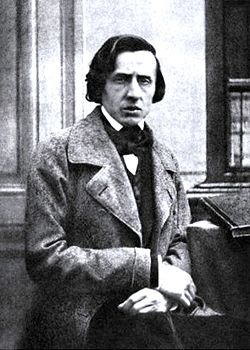Frédéric Chopin
From Wikipedia, the free encyclopedia

Frederic [Francois] Chopin (Polish: Fryderyk [Franciszek] Chopin, sometimes Szopen; French: Frédéric [François] Chopin; surname pronounced /ˈʃoʊpæn/ in English; French pronunciation: [ʃɔpɛ̃]; 1 March 1810[1] – 17 October 1849) was a Polish composer and virtuoso pianist.[2][3] He was one of the great masters of Romantic music.[4]
Chopin was born in the village of Żelazowa Wola, in the Duchy of Warsaw, to a French-expatriate father and Polish mother and was regarded as a child-prodigy[5][6] pianist. On 2 November 1830, at the age of twenty, he left Warsaw for Austria, intending to go on to Italy. The outbreak of the Polish November Uprising seven days later, and its subsequent suppression by Russia, led to Chopin becoming one of many expatriates of the Polish Great Emigration.[7]
In Paris, Chopin made a comfortable living as a composer and piano teacher, while giving few public performances. Though an ardent Polish patriot,[8][9] in France he used the French versions of his names and eventually, to avoid having to rely on Imperial Russian documents, became a French citizen.[10][11][12] After some ill-fated romantic involvements with Polish women, from 1837 to 1847 he had a turbulent relationship with the French authoress George Sand. Always in frail health, he died in Paris in 1849, aged thirty-nine, of pulmonary
Chopin's compositions were written primarily for the piano as solo instrument. Though they are technically demanding,[15] the emphasis in his style is on nuance and expressive depth. Chopin invented musical forms such as the instrumental ballade[16] and was responsible for major innovations in the piano sonata, mazurka, waltz, nocturne, étude, impromptu and prélude.

No comments:
Post a Comment